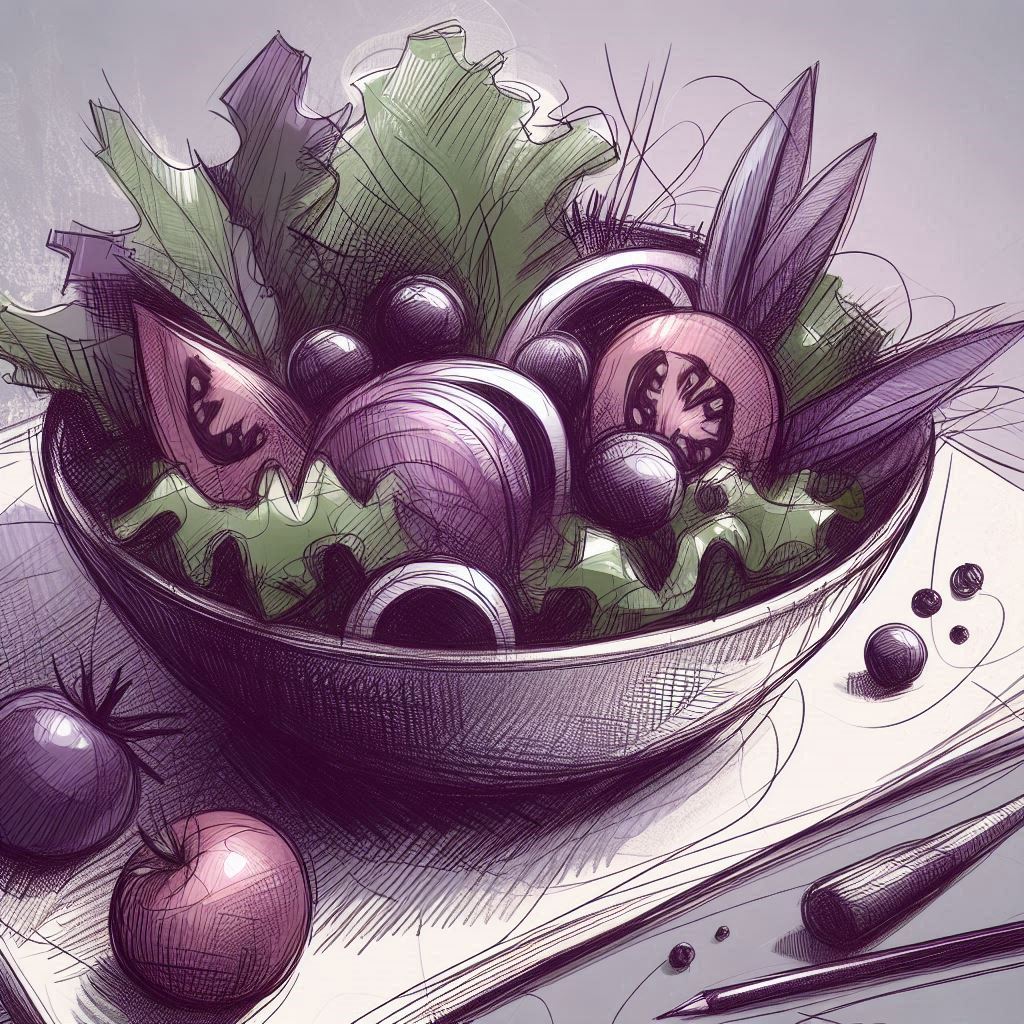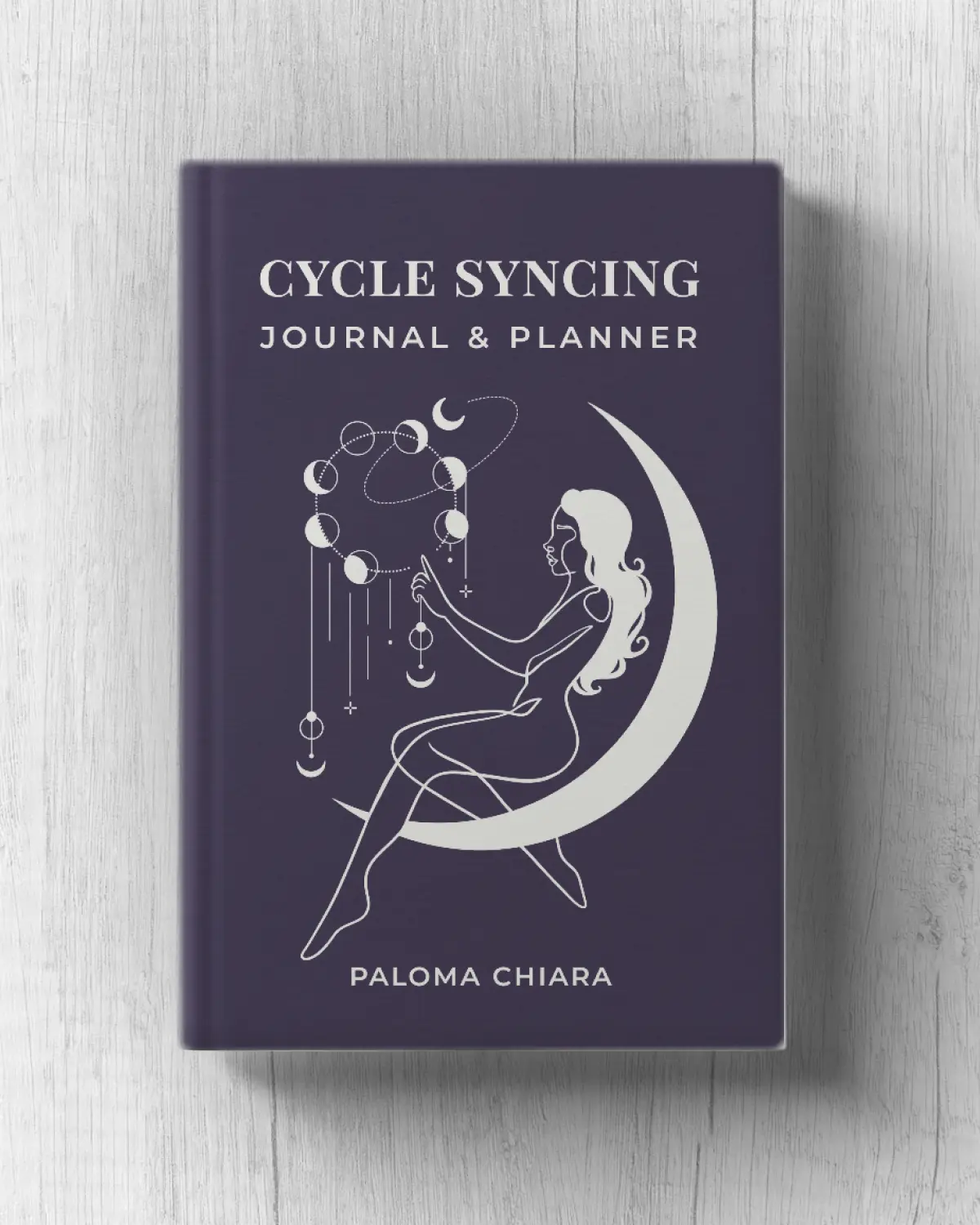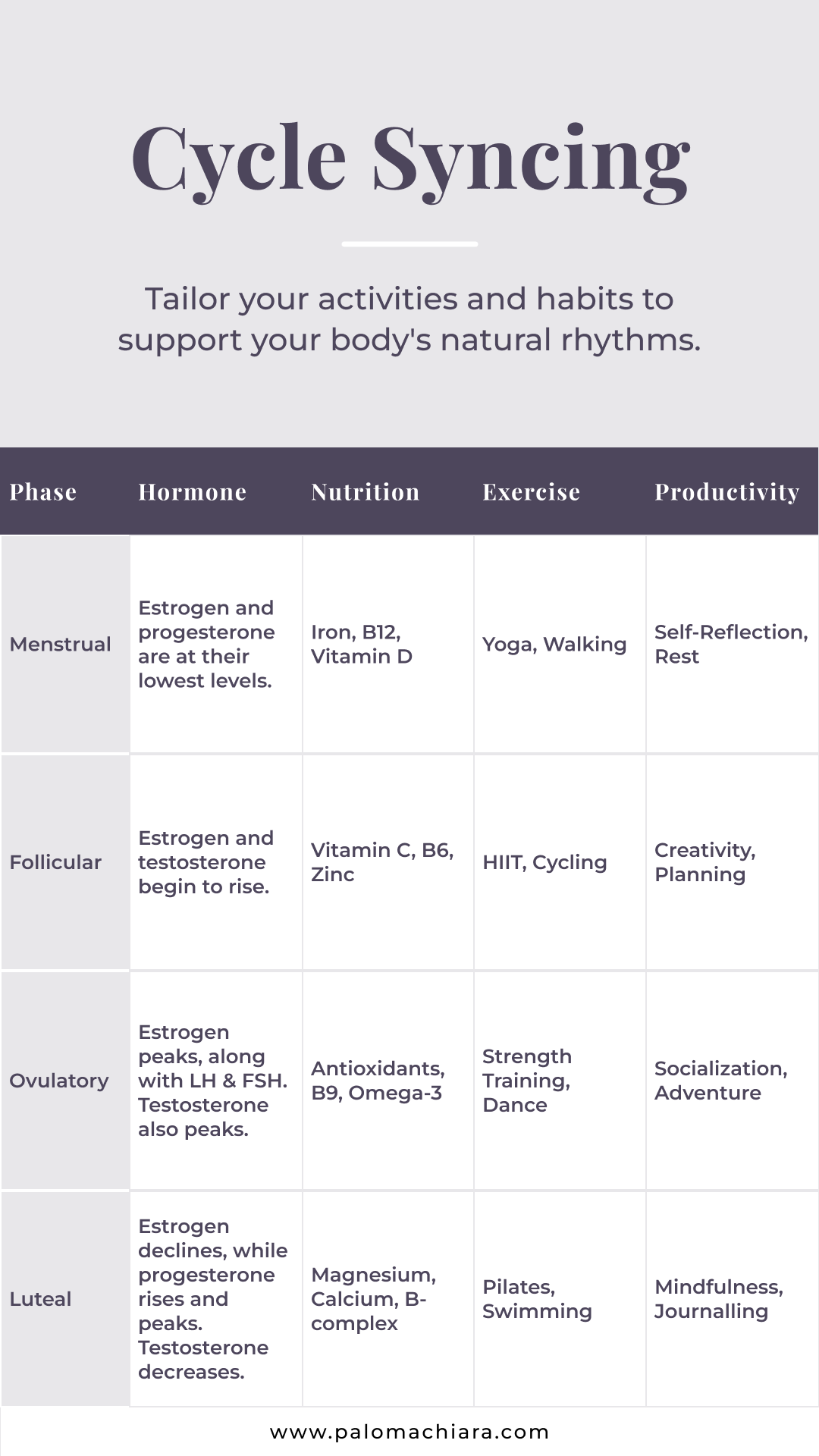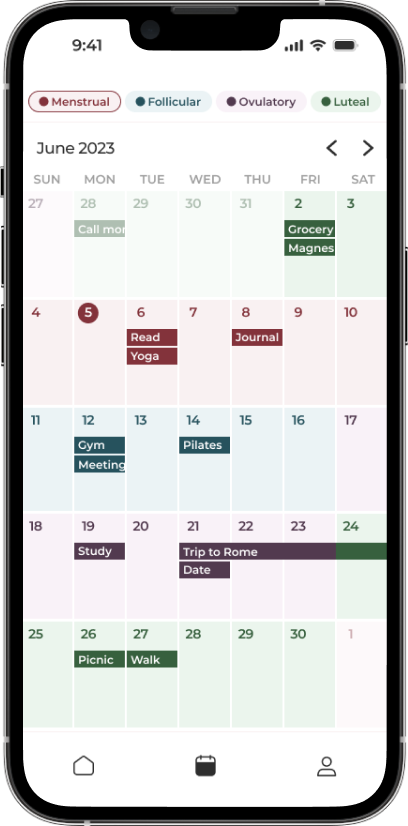28-Day Vegetarian Meal Plan Based on Your Menstrual Cycle

Maintaining balance throughout the menstrual cycle involves more than just tuning into your body’s physical and emotional needs—it also means nourishing yourself with the right foods at the right times. Meal planning tailored to the phases of your menstrual cycle can be a game-changer when it comes to supporting hormone balance, managing cravings, and optimizing overall well-being. Let’s explore the myriad benefits of incorporating a cycle-synced meal plan into your lifestyle.
Hormonal Harmony
The menstrual cycle is governed by fluctuations in hormone levels, which can affect everything from energy levels to mood and appetite. By aligning your meal plan with the phases of your cycle, you can support hormonal balance and minimize hormonal fluctuations. For example, during the luteal phase when progesterone levels are high, focusing on nutrient-dense foods can help alleviate symptoms such as bloating and mood swings.
Enhanced Energy
Different phases of the menstrual cycle demand different levels of energy and nutrients. By strategically planning your meals to coincide with these fluctuations, you can ensure that your body has the fuel it needs to thrive throughout the month. For example, incorporating complex carbohydrates during the follicular phase can provide sustained energy to support increased physical activity and productivity.
Cravings Management
Cravings are a common occurrence during certain phases of the menstrual cycle, often driven by hormonal changes and fluctuations. By proactively planning meals that address specific cravings and nutritional needs, you can minimize the urge to indulge in unhealthy foods and better manage cravings. For example, incorporating magnesium-rich foods like dark leafy greens and nuts during the luteal phase can help alleviate chocolate cravings and mood swings.
Optimal Nutrient Intake
The menstrual cycle influences nutrient needs, with certain vitamins and minerals playing a crucial role in supporting reproductive health and overall well-being. By tailoring your meal plan to meet these changing nutritional requirements, you can ensure that your body receives the essential nutrients it needs to function optimally. For example, focusing on iron-rich foods like legumes and leafy greens during menstruation can help replenish iron stores lost through menstrual bleeding.
Improved Digestion
Digestive function can vary throughout the menstrual cycle, with some individuals experiencing bloating, constipation, or gastrointestinal discomfort during certain phases. By choosing foods that are easy to digest and gentle on the stomach, you can support digestive health and minimize discomfort. For example, incorporating fiber-rich foods like fruits, vegetables, and whole grains can help promote regularity and alleviate bloating during the luteal phase.
Emotional Well-Being
Nutrition plays a crucial role in supporting mood and emotional well-being, with certain nutrients and food choices impacting neurotransmitter production and brain function. By prioritizing nutrient-dense foods and incorporating mood-boosting ingredients into your meals, you can support emotional stability and mental health throughout the menstrual cycle. For example, omega-3 fatty acids found in fatty fish and flaxseeds have been shown to support brain health and mood regulation.
Time and Stress Management
Meal planning can save time and reduce stress by streamlining the grocery shopping and cooking process. By dedicating time each week to plan and prepare meals in advance, you can minimize decision fatigue and ensure that you have nourishing options readily available. This can be especially beneficial during busy or stressful times when self-care often takes a backseat.

Check out the Cycle Syncing Journal & Planner for only 6$
More info28-Day Vegetarian Meal Plan
Here is an example of how your meal plan could look like. Adapt as needed.
Menstrual Phase (Days 1-5)
Needed Nutrients
- Iron: The menstrual phase is characterized by blood loss, so it’s essential to replenish iron stores lost during menstruation. Iron-rich foods such as leafy greens, legumes, and fortified grains can help prevent iron deficiency anemia and support energy levels.
- Magnesium: Magnesium helps alleviate menstrual cramps and promote relaxation. Foods rich in magnesium, such as nuts, seeds, and dark chocolate, can help ease discomfort and support mood stability during this phase.
- B Vitamins: B vitamins play a crucial role in energy metabolism and mood regulation. Incorporating foods rich in B vitamins, such as whole grains, eggs, and legumes, can help combat fatigue and support emotional well-being.
Meal Plan
Day 1: Lentil Soup
Ingredients: Lentils, Spinach, Whole Grain Bread, Onion, Carrot, Celery, Vegetable Broth
Day 2: Sweet Potato and Black Bean Chili
Ingredients: Sweet potatoes, Black beans, Avocado, Tomatoes, Onion, Garlic, Vegetable Broth, Canned diced tomatoes
Day 3: Tofu Scramble
Ingredients: Tofu, Spinach, Tomatoes, Onion, Garlic, Turmeric, Nutritional yeast, Whole Grain Bread
Day 4: Banana Chia Oatmeal
Ingredients: Oats, Bananas, Chia seeds, Almond milk, Maple syrup, Almond butter, Mixed berries
Day 5: Avocado Chickpea Salad
Ingredients: Avocado, Chickpeas, Cherry tomatoes, Cucumber, Red onion, Mixed greens, Lemon, Olive oil, Balsamic vinegar
Follicular Phase (Days 6-14)
Needed Nutrients
- Complex Carbohydrates: The follicular phase is characterized by rising estrogen levels and increased energy expenditure. Complex carbohydrates provide sustained energy and support mood stability. Foods such as whole grains, fruits, and vegetables are excellent sources of complex carbohydrates.
- Protein: Protein is essential for muscle repair and growth, as well as hormone production. Incorporating lean protein sources such as tofu and legumes can help support muscle recovery and hormone balance during this phase.
- Omega-3 Fatty Acids: Omega-3 fatty acids have anti-inflammatory properties and support brain health. Foods rich in omega-3s, such as flaxseeds and walnuts can help support cognitive function and mood regulation.
Meal Plan
Day 6: Quinoa Veggie Bowl
Ingredients: Quinoa, Mixed vegetables (bell peppers, zucchini, carrots), Kale, Cherry tomatoes, Avocado, Balsamic vinegar, Olive oil
Day 7: Almond Butter Toast and Smoothie
Ingredients: Whole grain bread, Avocado, Cherry tomatoes, Almond butter, Almond milk, Mixed berries
Day 8: Chickpea Tofu Salad
Ingredients: Chickpeas, Tofu, Spinach, Kale, Bell peppers, Red onion, Cherry tomatoes, Tofu, Lemon, Olive oil, Tahini
Day 9: Mango Edamame Quinoa Bowl
Ingredients: Quinoa, Mango, Edamame, Bell peppers, Red cabbage, Carrots, Cilantro, Lime, Sesame oil, Soy sauce
Day 10: Tofu Stir-Fry
Ingredients: Tofu, Mixed vegetables (bell peppers, broccoli, carrots), Quinoa, Soy sauce, Garlic, Ginger, Olive oil
Ovulatory Phase (Days 15-19)
Needed Nutrients
- Folate: The ovulatory phase is a critical time for reproductive health, as ovulation occurs. Folate plays a crucial role in DNA synthesis and cell division, making it essential for fertility and pregnancy. Foods rich in folate, such as leafy greens, citrus fruits, and beans, can support reproductive health during this phase.
- Antioxidants: The surge in estrogen during the ovulatory phase can increase oxidative stress. Antioxidants help neutralize free radicals and protect cells from damage. Incorporating antioxidant-rich foods such as berries, bell peppers, and green tea can support overall health and reduce inflammation.
- Zinc: Zinc plays a role in hormone regulation and supports immune function. Foods rich in zinc, such as pumpkin seeds and lentils can help support hormonal balance and immune health during this phase.
Meal Plan
Day 11: Mango Tofu Quinoa Bowl
Ingredients: Quinoa, Mango, Tofu, Spinach, Bell peppers, Red onion, Cilantro, Lime, Olive oil
Day 12: Chickpea Avocado Salad
Ingredients: Chickpeas, Spinach, Avocado, Cucumber, Cherry tomatoes, Red onion, Lemon, Olive oil, Tahini
Day 13: Tofu Veggie Stir-Fry
Ingredients: Tofu, Mixed vegetables (bell peppers, broccoli, snap peas), Soy sauce, Garlic, Ginger, Quinoa, Olive oil
Day 14: Spinach Mango Smoothie Bowl
Ingredients: Spinach, Mango, Almond milk, Banana, Protein powder, Chia seeds, Almond butter
Day 15: Quinoa Stuffed Bell Peppers
Ingredients: Quinoa, Bell peppers, Red onion, Black beans, Corn, Tomatoes, Avocado, Lime, Cilantro
Luteal Phase (Days 20-28)
Needed Nutrients
- Calcium: The luteal phase is associated with changes in mood and potential fluid retention. Calcium helps regulate muscle function and may alleviate premenstrual symptoms such as bloating and mood swings. Foods rich in calcium, such as dairy products, leafy greens, and fortified plant-based milk, can support bone health and mood stability during this phase.
- Vitamin D: Vitamin D plays a role in mood regulation and immune function. Incorporating vitamin D-rich foods such as egg yolks and fortified dairy products can help support emotional well-being and immune health during the luteal phase.
- Fiber: Fiber helps promote regularity and prevent constipation, which can be common during the luteal phase. High-fiber foods such as fruits, vegetables, whole grains, and legumes can support digestive health and alleviate gastrointestinal discomfort during this phase.
Meal Plan
Day 16: Coconut Lentil Curry
Ingredients: Cauliflower, Lentils, Coconut milk, Spinach, Onion, Garlic, Turmeric, Ginger, Brown rice
Day 17: Tempeh Sweet Potato Curry
Ingredients: Tempeh, Sweet potatoes, Cauliflower, Coconut milk, Spinach, Onion, Garlic, Ginger, Brown rice
Day 18: Pumpkin Chickpea Stew
Ingredients: Pumpkin, Chickpeas, Kale, Onion, Garlic, Coconut milk, Curry powder, Brown rice
Day 19: Quinoa Salad with Tahini Dressing
Ingredients: Quinoa, Bell peppers, Cucumber, Chickpeas, Red onion, Kale, Lemon, Olive oil, Tahini
How to Schedule Your Cycle-Synced Meal Plan
Now that you have your 28-day vegetarian meal plan, the next step is putting it into action. The secret to consistency isn’t willpower—it’s having a system that works with your body’s natural rhythm. That’s where Kilova comes in. This innovative app integrates your menstrual cycle directly into your calendar, making it effortless to plan your meals, workouts, self-care practices, and daily routines around your hormonal fluctuations.
Step 1: Create Your Kilova Account
Head over to Kilova.app and sign up for your free account. The process takes less than a minute—all you need is your email address. Once you’re in, you’ll be prompted to enter your cycle information, including the length of your average cycle and the first day of your last period. This data allows Kilova to predict your four menstrual phases and create a personalized calendar that aligns with your unique rhythm.
Pro tip: Use the coupon code CHIARABLOG2 at checkout to get 2 months completely free! This gives you plenty of time to explore all the features and establish your cycle-syncing routine.
Step 2: Add Your First Meal to the Calendar
Now comes the fun part—scheduling your cycle-synced meals! Let’s start with Day 1 of your menstrual phase. Click on the first day of your predicted menstrual phase in the calendar view. Select “Add Task” and type in the meal you want to prepare, such as “Lentil Soup” from the meal plan above.
Once you’ve added the task name, scroll down to find the “Phase Repeat” option. This is where Kilova’s magic happens. Select “Menstrual Phase” and choose “Repeat first day of each menstrual phase.” This tells the app to automatically schedule Lentil Soup on the first day of every menstrual phase going forward. No more manually entering the same meal every month—Kilova does it for you!
Step 3: Repeat for Each Phase
Continue adding meals for each phase of your cycle using the same process. For example:
- Menstrual Phase (Days 1-5): Schedule iron-rich meals like Lentil Soup, Sweet Potato and Black Bean Chili, or Tofu Scramble
- Follicular Phase (Days 6-14): Add energizing meals like Quinoa Veggie Bowl, Almond Butter Toast and Smoothie, or Tofu Stir-Fry
- Ovulatory Phase (Days 15-19): Plan antioxidant-rich options like Mango Tofu Quinoa Bowl or Spinach Mango Smoothie Bowl
- Luteal Phase (Days 20-28): Include comforting, fiber-rich meals like Coconut Lentil Curry, Tempeh Sweet Potato Curry, or Pumpkin Chickpea Stew
You can set different meals to repeat on different days of each phase, creating a varied and nutrient-dense rotation that evolves with your hormonal needs. The flexibility is entirely in your hands!
Step 4: Add Other Cycle-Syncing Practices
Your meal plan is just the beginning. Kilova is designed to help you sync every aspect of your lifestyle to your cycle. Consider adding:
- Workout routines: High-intensity interval training during your follicular phase, gentle yoga during menstruation, strength training during ovulation, and low-impact exercises during the luteal phase
- Self-care rituals: Bath time with Epsom salts during menstruation, social activities during ovulation, journaling sessions during the luteal phase
- Supplement schedules: Track seed cycling protocols (pumpkin and flax seeds in the follicular phase, sunflower and sesame seeds in the luteal phase), herbal tea routines, or vitamin supplementation
- Work and productivity planning: Schedule important meetings and creative projects during your ovulatory phase when energy and communication skills peak, and reserve administrative tasks for your luteal phase
- Beauty and skincare routines: Adjust your skincare based on hormonal fluctuations—more hydration during menstruation, exfoliation during the follicular phase
The beauty of Kilova is that it allows you to create a holistic approach to cycle syncing, not just meal planning. Every task can be set to repeat according to your phase, creating a sustainable lifestyle that honors your body’s natural wisdom.
Step 5: Sync with Google Calendar
One of Kilova’s features is its Google Calendar integration. By connecting your Kilova account to Google Calendar, all your phase-based meals and activities automatically appear alongside your regular schedule—work meetings, appointments, social events, and everything else.
This is particularly helpful for long-term planning. Scheduling a work presentation? Check your calendar to see if it falls during your high-energy ovulatory phase. Planning a weekend getaway? Make sure it doesn’t coincide with the first days of your period when you might want more rest. With everything in one place, you can make informed decisions that set you up for success.
Ready to transform your approach to meal planning and cycle syncing? Create your free Kilova account today and use code CHIARABLOG2 for 2 months free. Your future self will thank you!

Still waiting for the 'perfect time'?
Email me what you'd do if you stopped making excuses. We'll work backwards from there.
Let's startRecent posts
-
The Complete Guide to Becoming a High Achiever
Read blog -
How To Make a Positive Impact in Your Community
Read blog -
What Is the “Winter Arc” Challenge?
Read blog -
What Is "the Great Lock-In" and Should You Try It?
Read blog -
What Are the 75 Hard and Soft Challenges?
Read blog -
How to Validate Yourself
Read blog

The App Made To Sync Your Lifestyle to Your Menstrual Cycle.
A solution for women who are looking to keep track of what they sync to their cycles, such as fitness, diet, etc. by adding it to a calendar that also predict their phases.
Learn more




Comment